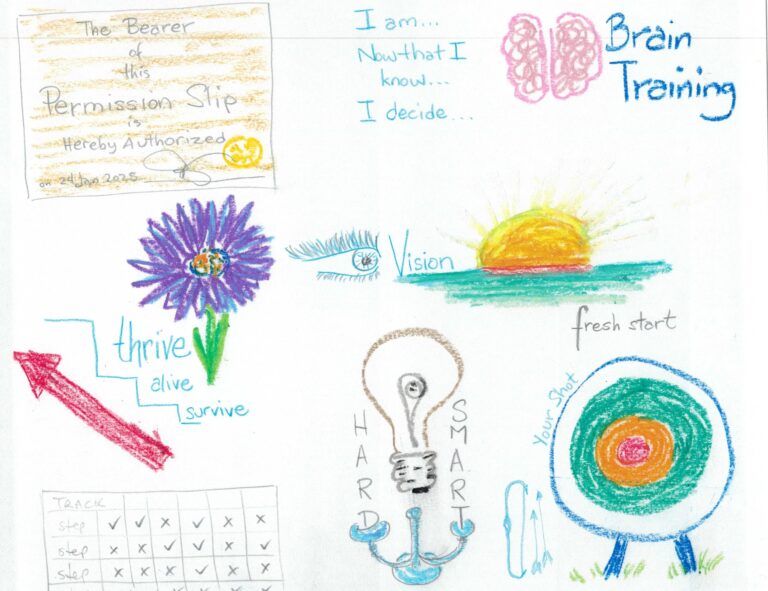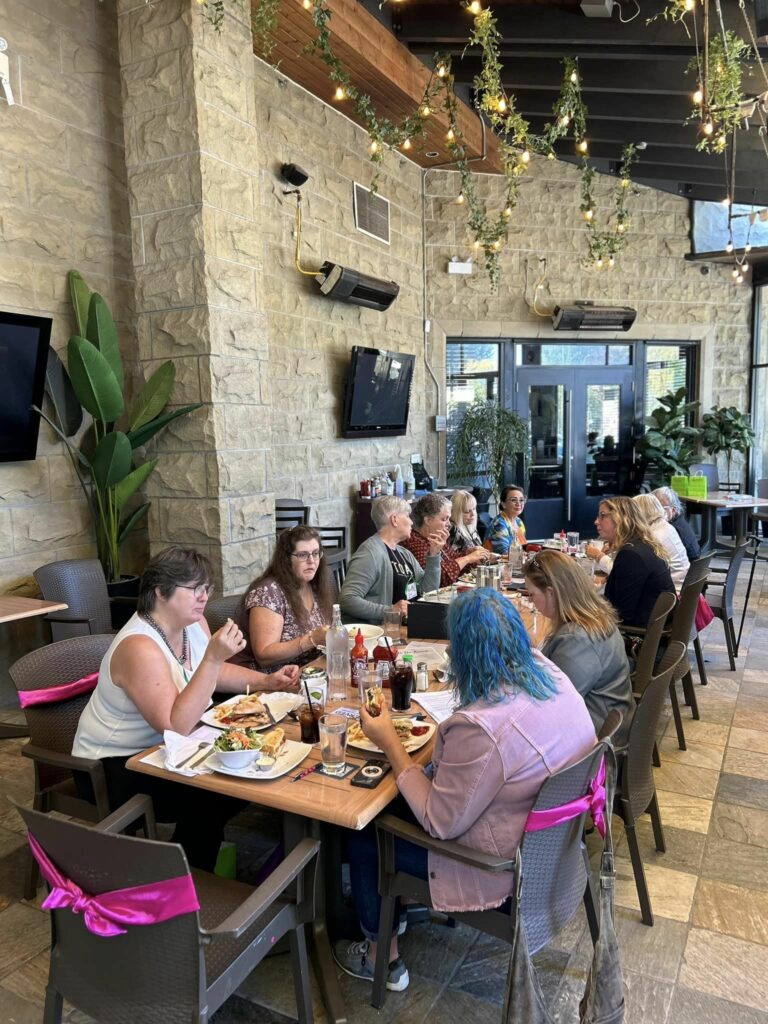By Linda Clement
ThriveParenting Coach
“I am such a failure, my kids are all bickering all the time, they never do anything unless I nag them all the time, and I know I’ve traumatized them by shouting at them like a crazy person.”
(How’s your day going?)
This is a fairly frequent collection of ‘why parents contact me in the first place.’ As you can see, this sounds not only pretty deep and difficult, but also pretty vague and negative. How can coaching help a parent who says things like this?
Here’s an overview of what is done in a ThriveParent coaching session…
Taking Notes
I listen. First, to complaints like that –making notes of a few words:
Failure.
All the time.
Never.
Nag.
Traumatized.
Shouting.
Crazy.
As these are all the words actually used by real clients (blended into one generic client, for the privacy and dignity of those involved…) I don’t censor them –during the session or anywhere else. We may talk about some issues built into these words, later… we shall see.
20 Questions
I ask for specifics, like:
‘What would success look like, if this is failure?’
‘How many kids? Their ages? Can you give me a brief temperament outline for each?’
‘What are they not doing that you want them to do?’
‘What are they doing that you don’t want them to do?’
‘How many hours a day, on average, would you say that you spend shouting?’
‘What would a not crazy person look like, to you, in this situation?’
From these answers and the stories that come along with them, I gather a sketch of what is happening in this parent’s head as well as what’s happening in their home.
Client-Centred Coaching
From this point onward, coaching sessions are highly personalized, and delve into issues and ideas based on two things:
- what the parent sees as the core of the problem (not always the same thing as what I would think of as the core of the problem) and,
- what I know about the range of ages and stages of the kids involved, cultural messages and pressures that transform into internal criticism (unhelpful), and a broader context for the whole situation.
Look for What Is Working
We often talk about specifics:
- the best times of the day,
- what is working, and,
- what this parent has accomplished recently that was novel, successful, hard-won, or meaningful to them.
This is not to create any silly positivity, but to round out the story with more of the details that a mind focusing on the negative is unlikely to notice, much less highlight or celebrate.
What Does This Parent Want?
We often discuss this parent’s (or family’s) long-term goals:
- what they most want their kids to remember about growing up in this home; and
- what kind of adults this parent would be proud to claim as their children in public.
Adding Context, Sharing Wisdom
I often share other parent’s stories, struggles, wins and failures … always with sufficient detail altered or removed to make the people involved unidentifiable, even to me. Here’s one I use often in the ‘failure as a parent category’ …
“She called because she was a total mom-fail: she’d been extremely frustrated and irritated, shouting about how the kids needed to put away their toys ‘because the house was a rental and the carpet needed to not be destroyed because of her damage deposit she couldn’t afford to lose’ when she picked up a little wooden three-legged stool and threw it over her shoulder backwards –right through a 150 gallon fish tank.” Bye-bye carpet…
Sometimes, I make suggestions for activities to do following the session, to handle negative thinking, worries, communication issues, mindset practice, or to grow awareness of an inner critic and how to handle that more effectively. One tool I love to use is from Jack Canfield’s Success Principles, a step-by-step process to transform the inner critic to an inner coach:
Take a specific negative self-talk that is pretty common in your head (‘I’m a failure’ is a very good example) and flesh out the rest of the story: what are you afraid will happen if it’s true (‘my kids will be permanently damaged by my terrible parenting’) and what is the love underpinning that story? (‘I love my kids and want them to come out of their childhoods healthier than I did, so they don’t have to struggle as much as I have.’)
After all that, knowing now what the real goal is (‘my kids coming out of their childhoods healthier than I did’) it is possible to make a specific, measurable, positively-phrased request that is something doable (unlike ‘I’m a failure’ which may or may not be true now or in the future, but there is nothing at all to be done about it.) … in the sample here, something like: ‘When I get frustrated and irritated, please take a break to gather myself before I say anything out of control or damaging.’
A vague, unmeasurable, negatively-phrased request would sound more familiar: ‘I need to stop being frustrated and irritated and be less crazy’ which is not only impossible to ‘do’ it’s also virtually impossible to know if you are ‘doing’ it.
I tell stories, quote others (friends, clients, authors & speakers, sometimes myself and occasionally the parent in the session, because they’re often wiser about their own lives and families than they give themselves credit for… one favourite, that I say to many people who express a lot of guilt over their earlier, less wise parenting choices is:
I have never met anyone interesting who has never had anything difficult to deal with… (I do remember that this is credited to Michele Poirier’s therapist, as quoted by Michele.)
Focus on Behaviour
Sometimes, we talk about a child’s behaviour. This is often where parents want to start the conversation and focus the solution. I find that focus to not only be unhelpful, but it’s not a place where solutions can be readily applied.
The thing about a child’s behaviour is that it isn’t in the future, but the past. It can highlight problems with the environment, communication struggles, developmental realities, and gaps in understanding … it cannot be altered then. As Terry Pratchett so brilliantly puts it: things that have happened stay happened.
Another wise person said, ‘All behaviour is communication.’ One more time for the people in the back:
All Behaviour is Communication
To figure out what it is being communicated takes a step back, a longer view, often a pause.
- Is this child
a. hungry
b. angry
c. thirsty
d. sad
e. in need of fresh air or movement
f. tired
g. being annoyed by someone
h. getting interrupted
i. frustrated
j. not tired
k. not hungry
l. disappointed
m. exploring the world
n. stressed out
o. needing to practice a skill
p. in need of a hug? - Is this environment developmentally appropriate for this child’s impulse control?
- Is this child’s schedule meeting all the child’s basic needs for:
a. a sense of security
b. love and belonging
c. power
d. freedom and,
e. fun? - Are the commands and expectations realistic, in terms of this child’s knowledge, ability, interest, and energy level?
I highlight the importance of remembering that immature people (children, naturally) have and use immature communication skills until they develop the ability to learn more mature communication skills…
When that child is in an environment where mature communication skills are being demonstrated daily, they will learn them as soon as they can. Coaching often includes communication skills development.
Change is Uncomfortable
Throughout the process of ThriveParent coaching, parents are reminded over and over that change is uncomfortable, change is often slow, change attracts criticism and resistance, change is stressful.
Even the most desired changes are hard to make: if they were easy, no one would ever seek support… and speaking of support:
It Takes a Village to Raise a Parent
No family is an island, however much our society seems bent on cutting people off from social support structures, so coaching also sometimes engages a teambuilding approach.
From developing friend-making skills to looking for community resources to benefit from (and get involved with), even the most isolated of parents can find people and build a social safety net for themselves and others.
Parents (and sometimes kids) are routinely referred to others. From online hobby and interest groups and chiropractic care to massage therapy and naturopathic care, art therapy, lawyers, accountants, dojos, and more. The more skilled and helpful people a parent has available, the healthier the whole family will become.






